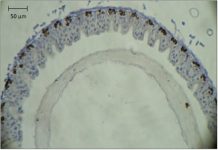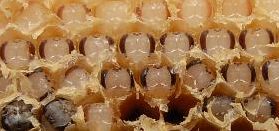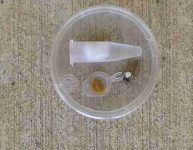We seek to explore different model stressors and the honey bee’s biological responses to them because stress and stress resistance are intimately linked to aging and honey bee health. Even though we understand the effect of stress in vertebrates and invertebrate models, honey bee stress biology has only recently started to be explored in detail. Therefore, little is known and we predict that numerous idiosyncrasies have evolved in honey bees due to the unique selection pressures in kin-selected social systems. To formalize the unique situation of honey bees and other social insects, we are proposing the social stress protection hypothesis as a natural extension of the concept of social immunity to all stressors. Currently, we focus mostly on temperature and oxidative stress, and their interaction with biotic stressors.
 |
 |
 |
Examples:
Walton A, Herman J.J., Rueppell O (2024) Social life results in social stress protection: A novel concept to explain individual life history patterns in social insects. Biological Reviews doi:10.1111/brv.1307
Kennedy A., Herman J.J., Rueppell O (2021) Reproductive activation in honey bee (Apis mellifera) workers protects against abiotic and biotic stress. Philosophical Transactions of the Royal Society B, 376: 20190737.
Li-Byarlay H., Boncristiani H., Howell G., Herman J., Clarke L., Strand M.K., Tarpy D.R., Rueppell O. (2020) Transcriptomic and epigenomic dynamics of honey bees in response to lethal viral infection. Frontiers in Genetics, 11:566320.
Rueppell O., Yousefi B., Collazo J. & Smith D. (2017) Early life stress affects mortality rate more than social behavior, gene expression or oxidative damage in honey bee workers. Experimental Gerontology, 90: 19-25.
Simone-Finstrom M., Li-Byarlay H., Huang M.H., Strand M.K., Rueppell O., & Tarpy D.R. (2016) Migratory management and environmental conditions affect lifespan and oxidative stress in honey bees. Scientific Reports, 6: 32023.
Li-Byarlay H., Huang M.H., Simone-Finstrom M., Strand M.K., Tarpy D.R., & Rueppell O. (2016) Honey bee (Apis mellifera) drones survive oxidative stress due to increased tolerance instead of avoidance or repair of oxidative damage. Experimental Gerontology, 83(10): 15-21.
Forkpah C., Dixon L.R., Fahrbach S.E., Rueppell O. (2014) Xenobiotic effects on intestinal stem cell proliferation in adult honey bee (Apis mellifera L) workers. PLoS ONE, 9(3): e91180.
